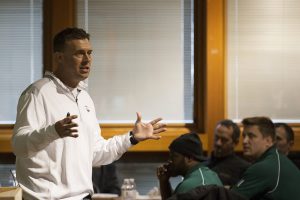National Coach of the Year Works With Coaches of DMPS
Jason Negro coaches high school football at the smallest school in a California conference that ESPN has rated the strongest in the nation. To give you an idea, one of the member schools has produced three Heisman Trophy winners. No wonder one of the watchdog organizations in the business of such things conferred National Coach of the Year status on Negro and crowned his team mythical National Champions when the St. John Bosco Braves went 16-0 in 2013. And no wonder the room was filled with DMPS coaches from a range of sports when Negro spoke on Wednesday night at an event in Windsor Heights.
The title of his talk “From Chumps to Champions,” alluded to the fact that when Negro got the job at his alma mater (where he was a classmate and teammate of former American League Rookie of the Year and All-Star Nomar Garciaparra; Nomar played shortstop, Negro was at 3B) the all-male parochial school located in Bellfower, between Long Beach and Los Angeles, hadn’t made the playoffs in eight years.
No, at first glance Negro’s situation doesn’t strike as very analogous to those faced by the audience he came here to address. Besides coaching fulltime at a parochial school that travels as far and wide as Hawaii and New Jersey for games, he has 220 kids in his program, a number that drew envious whistles and gasps Wednesday night.
But he started his head coaching career at the age of 29 in a public school and lost his first eight games. And his current high-profile post draws upon a demographic pool as diverse as the one here. He told the story of a Hispanic player he coached several years ago who came to him the week of a road trip to Salt Lake City and told him he couldn’t make the trip. The player was in the country illegally and feared deportation if his status was discovered at an airport security checkpoint. Fast forward to 2013 when a young man, by then a former Bosco Brave, was sworn in as an American citizen, sponsored by one of the assistant coaches on Negro’s staff.
Negro’s appearances here sprang from his friendship with Roosevelt principal Kevin Biggs who grew up in California and began his career as an educator there. At one point he was an assistant on Negro’s football staff. At another he was the decorated coach’s boss as a vice-principal.
Sandwiched around the Wednesday night event was a whirlwind tour of the five district high schools where Negro met specifically with the football coaching staffs and team members. The last of those visits was Friday morning at East before Negro flew back home.
Players shuffled into the auditorium and took seats. Athletic Director Lyle Fedders introduced Coach Negro. He was wearing blue jeans, not a crown, and a pullover warmup with Bosco Football emblazoned on one of the sleeves. Maybe some of the kids were bracing for a serving of blah-blah. But when the speaker opened with some strategic name-dropping of alums form the Trinity League (“Any of you guys ever hear of Mark Sanchez or Matt Leinart?”) the whole room sat up and dialed in.
Coach Negro stressed three fundamentals of success that he told the Scarlets, as he’d already told their counterparts at the other four DMPS high schools, are controllable by them:
- Commitment to the hard work of physical training
- Commitment to academics
- Personal behavior/good citizenship
“You guys need to hold each other accountable and self-police,” he said. “And academics are a big part of making yourselves recruitable athletes. You’ve got to have the core credits and the GPA to qualify by NCAA standards.”
Eyes opened a little wider when he said that on national letter-of-intent day in February Coach Negro had 13 players formally accept scholarships this year. The year before there were 11.
“The schools range from BCS to Division III. Not all of them play on national TV on Saturdays but every one of those kids earned a free college education,” said Negro.
The message was really nothing new. “I’m just another voice from the outside telling you the same things you’ve probably heard before from coaches and parents,” Negro admitted. The difference is that his version of the not-so-magic recipe includes the finished product, not just the raw ingredients. No, he wasn’t wearing a crown but he does sport a mighty impressive ring that’s hard not to notice on one of his hands.
Given the chance, boy did the team have questions.
“Any chance of you coming here to play us?”
Negro smiled; next question.
“Ever hear of Long Beach Poly?”
“Yeah, we beat them last year, 33-21.”
“Ever fall behind?”
“In 2013, (when they ultimately beat the school that’s the subject of the Hollywood film When the Game Stands Tall to win the state title and the mythical national championship) we were down 18 at halftime to a team from Arizona. I didn’t know what I was going to tell the team in the locker room. One of our seniors stopped me at the door and said, ‘Coach, this is on us. We got this.’ We outscored them 35-3 in the second half.”
When he was finished Coach Negro yielded the floor to Scarlet Head Coach Greg Schoon.
“Have you ever heard me tell you most of the stuff he just told you?” Schoon asked. Yes, to a man, they had. “There are college football players sitting in this room. I know what one looks like and acts like and there are some in here,” Schoon continued. “Now get back to class and buckle down.”
In the hallway outside the auditorium a few of the pumped up players paused to compare notes.
“Man, we can beat Dowling,” one of them said. The others looked at each other and nodded.
It may be a matter of time.





